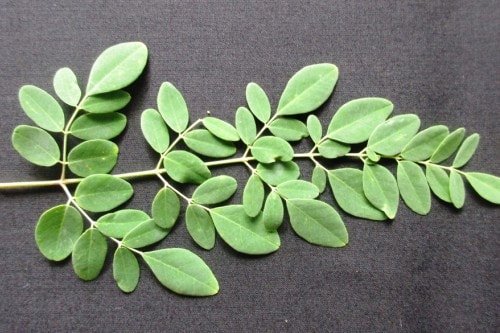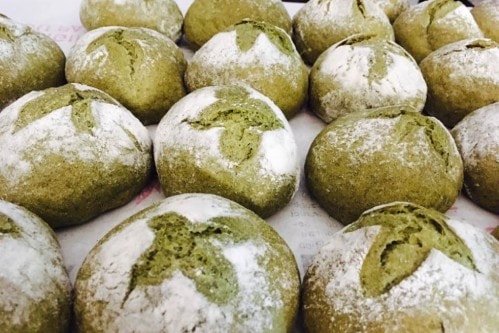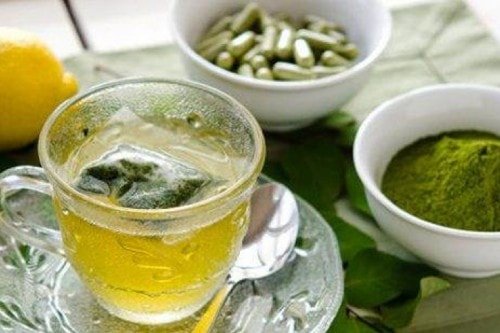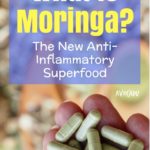What is Moringa? The New Anti-Inflammatory Superfood
Moringa powder has been flying off the shelves lately, and if you haven’t tried this superfood yet, you might be wondering what is moringa and what all the fuss is about.
Moringa has been used in Pakistan, India, and Nepal for thousands of years to treat and prevent many types of health conditions.
The natural wellness industry finally caught on to this superfood, and it has become a popular supplement.
Its ability to treat and heal the cardiovascular system, digestive disorders, allergies, and many other ailments have been proven in over a thousand studies.
When you’ve got that much research to back a nutritional supplement up, you can be pretty sure it’s worth the hype.
Let’s talk a little bit more about what is moringa before we delve into the moringa health benefits and where you can get it!
This post may contain affiliate links, which helps keep this content free. Please read our disclosure for more info.
What is Moringa?

Moringa oleifera is a small tree that’s native to India, but you can find it all over Asia, Africa, and South America. It’s also called the ben oil tree, drumstick tree, and horseradish tree.
The National Institute of Health named it the “plant of the year” because of its science-backed health benefits and the fact that every part of the tree, including its bark, is edible. (1)
Its leaves are dried and ground into a powder that can be mixed into liquid or drunk as a tea. Many people love adding it to a smoothie for the extra oomph it gives them in the morning.
It only takes a couple of spoonfuls to get amazing benefits!
Not only is it easy to find in health food stores and at the market, but it will be around for a long time because of how easy it is to grow and cultivate.
The moringa tree isn’t just a supplement, though. It’s being used by conservationists to restore depleted forests and soil, and for water filtration, which has a big impact on third world populations.
Moringa is Nutrient Dense
Gram for gram, moringa has twice the protein as yogurt, seven times the vitamin C as oranges, and a whopping four times the calcium as cow’s milk. It’s also an excellent source of vitamin A and potassium.
In fact, it’s one of the most nutrient-dense superfoods out there, which is one of the reasons why organizations like WHO use it in third world countries to supplement low calorie and poor diets.
Amino acids are important to overall health, and moringa has 18 of them, including eight essential amino acids. (2) It’s also rich in flavonoids and EGCG, which are powerful antioxidants that boost the immune system.
It’s a complete plant protein, which is SO important if you’re a vegan. It’s also gluten-free and caffeine-free, so it’s the perfect superfood for sensitive people.
Moringa Fights Inflammation

An immune system gone wild can cause chronic inflammation and oxidative stress that results in health issues like arthritis, chronic pain, digestion and bowel problems, heart disease, MS, asthma, allergies, cancer, and so much more.
Moringa’s combination of essential amino acids, antioxidants, and phytonutrients work just as well fighting inflammation as anti-inflammatory drugs, according to multiple studies. (3)
The great thing about it is that it doesn’t have the same long-term side-effects as conventional medical treatments for these issues.
The CDC states that over 23% of the American adult population has symptoms of arthritis, a disease caused by inflammation of the joints.
The problem with most drugs used to treat it is that long-term use can cause high blood pressure, liver damage, and stomach ulcers. Moringa is a safe and clinically proven alternative to NSAIDS and steroids.
Researchers are starting to recognize that inflammation has a lot to do with mental health.
Moringa’s anti-inflammatory properties can help combat depression and anxiety naturally.
Moringa Oil Protects the Skin and Heals Skin Infections
It’s anti-bacterial and anti-fungal, so it’s going to fight infections both internally and on the skin. Pair that with its ability to reduce inflammation, and it’s a great treatment for acne.
Athlete’s foot is a common fungal infection that happens between the toes when feet are too moist in shoes for a long period of time. Moringa is a natural way to get rid of it and helps decrease the stinky odor that’s a result of it.
Moringa oil is one of those magical products that works as an astringent, so you can put it on your skin to dry out pimples while leaving it hydrated.
It restores the skin’s natural moisture barrier, so it protects it, too.
Free radical damage is known to cause oxidative stress that damages cells and ages us on both the inside and the outside. Moringa’s incredible antioxidants reverse this damage and even keep it from happening.
It’s a Natural Way to Control Blood Sugar
Diabetes is a big deal in America. 9.4% of the population has it, and over a quarter-million people each year die of complications from it. (4)
High blood sugar makes other serious health problems like heart disease even worse, so its health risks are pretty substantial.
Moringa has chlorogenic acid and isothiocyanates in it, which help protect the body against diabetes. Chlorogenic acid controls blood sugar levels by helping cells process glucose.
A study done in Egypt found that moringa seed powder decreased three markers in the bloodstream that are common in diabetics. It also increased enzyme production in the liver, kidneys, and pancreas, which help balance blood sugar levels. (5)
Adding moringa to a healthy diet that controls blood sugar can be beneficial whether you are type 1 or type 2.
It’s Great for Gut Health

There are plenty of reasons why your gut might be giving you trouble. Maybe you’re making not so great food choices, live or work in an especially toxic environment, or you’ve got a health issue causing the problem.
Whatever the deal is, moringa can help your digestive tract in many ways.
One reason that many people have poor gut health is that, for whatever reason, they aren’t getting enough nutrients.
There’s a vicious cycle we can get into with our digestive system; we need it to be healthy, so we can process nutrients, but we need nutrients to keep it healthy!
Moringa is packed full of vitamins and minerals, including thiamin, niacin, and vitamins B2 and B3, which help metabolism and the breaking down of food.
Another reason is that moringa has 40 anti-inflammatory compounds that help produce good gut flora and reduce the bad, and reduce bloating, gas, and constipation.
It also detoxes the liver and gets rid of heavy metals and infections like yeast and H. pylori, a pathogen that can be responsible for ulcers, colitis, and gastritis. (6) It mops all this junk up and gets it out of the digestive system.
Its Seeds Can Be Used to Purify Water
Clean water is a big issue everywhere nowadays, not just in third world countries. Moringa seeds can be used to get rid of bacteria and other impurities that might be lurking in your drinking water.
The seeds have a positively charged protein called Moringa Oleifera Cationic Protein which kills many of the microorganisms that make water undrinkable and cause them to clump together and settle to the bottom of whatever container the water’s in.
The Impurities also stick to the seeds. You can crush them up, put them in water, let them sit for a bit, then pour the water through a strainer.
Studies show that as little as .2 grams of crushed moringa seed can clean up to 34 ounces of water of bacteria. (7)
The really cool thing about using crushed moringa seeds to purify water is that you can use them as fertilizer for your plants. It helps plants resist pests and certain diseases.
There are Many Ways to Use Moringa
There are a dozen different types, so make sure the kind you get is moringa oleifera. It’s the only one that has all the awesome healing properties we’ve been discussing.
It’s grown primarily in the east and middle eastern parts of the world, so it’s very difficult to get fresh unless you live in that part of the world. In North America and Europe, it’s usually sold in powdered form or dried.
The leaves will give you the best benefits, but some people don’t like their flavor much. They taste a little bit like spicy asparagus (yuck).
If that doesn’t sound appetizing to you, take them in capsule form, or get the powder and add it to a smoothie or green juice.
If you don’t mind the flavor, you can take it in tea form. Try not to boil the leaves because they can lose their healing properties.
The pods from the moringa seeds have a high concentration of protein in them, and they taste good when they’re roasted (like pumpkin seeds). You can also eat them just like nuts for a quick protein boost.
Moringa oil is sometimes called ben oil, and you can use it topically for skin issues.
Watch out for moringa that’s been mixed with synthetic ingredients because it can decrease it’s healing properties.
It’s also advised that pregnant women not take it because it can lead to contractions of the uterus.
If you enjoyed this article on what is moringa or have any questions, please leave them in the comment section below!







I am a retired senior , 64 years old . My ability to digest vegetables has diminished . I find it almost impossible at this point in my life to lose weight . I have fluctuated 40 pounds over the past 24 years and feel at a loss to determine what food I need to eat in what measurements and combinations to remain in a healthy state while shedding fat. I complete a series of spinal exercises 25 minutes a day and receive weekly corrective chiropractic treatments. There is more I could share about my health conditions but frankly need a guideline that would solve all my health concerns while achieving permanent weight loss. Can you help me? I have tried a dr. led low protein, low complex carb plan , Atkins, weight Watchers, primarily fruit plan , liquid protein diet and so many others to no avail Can you help seniors too , besides young people?
K.A.D.
Hi Karen. Our 21 Day Fat Loss Program would help with the weight loss, but it does include lots of vegetables. As for other health conditions, you will need to consult your doctor.
I’ve never heard of Moringa before but it sounds amazing! Spicy asparagus less so 😀